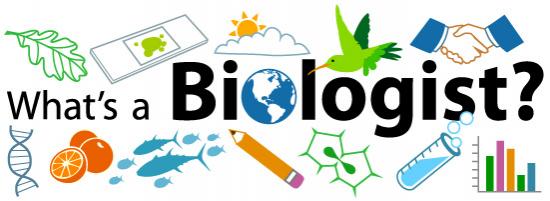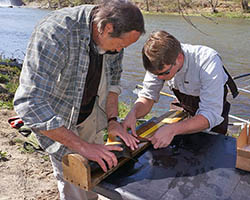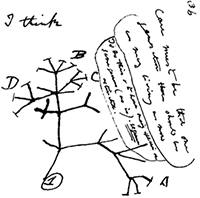Have a Question About Biologists or Biology?
This may be the place for you. Over the years, Ask A Biologist has received many questions about what it's like to be a biologist, ways to get into biology, and other more specific questions about becoming a biologist.
Below, we've listed some of the most common or interesting questions. Make sure to check back every once in a while, as we will continue to add to this list.
Do biologists get to spend time working with other people?
Yes, many biologists spend time with other people. Whether you study plants, animals, microbes, or something else within biology, you are often getting help from others, collaborating on an experiment, discussing new ideas, or presenting your work to others.
I'm a plant biologist and I work with people a lot when I work outside. There are also usually other people working in the herbarium with me, or herbarium staff that I can talk to about questions I have. The only thing I really have to do by myself is entering data and writing, but often there are still other people around when I do that.
How old were you when you decided to pursue science?
Lots of biologists have a childhood interest in the world around them. They might spend time outside looking for animals, planting a garden, or digging in the dirt. Other biologists don't realize they want to study science until they've had more life experiences. I started college in Brazil (my home country) when I was 17 years old. That's when I decided I wanted to major in Biology. At the time, I was interested in the microbiology and laboratory parts of biology, but I found out later on that I actually preferred ecology and field work.
I've heard studying biology is only for careers in medicine. Is this true?
No, that is not true.
While starting out studying biology is the best way to have a career in medicine, there are many, many other non-medical jobs in the field of biology.
Some biology is even focused on using existing research to come up with new theories.
Make sure to visit our Careers page to find out some of the other options you have within the field of biology.
How much money do biologists make?
Because there are so many different jobs within biology, there is a huge range of pay that biologists can earn. Most biologists will earn an income somewhere between $30,000 and $90,000 per year, but there are some jobs that pay even higher. The Bureau of Labor Statistics(link is external) has some information on salaries that you can check out. This information is updated every few years. Though not on the same list, they also have information on pay for professors(link is external).
I want to be a biologist. Which college should I attend?
You should choose a college based on what you are interested in studying, as well as what makes the most sense for you in terms of location and finances. Not all colleges offer the same programs, so make sure to figure out what programs are offered before applying to a school.
While some colleges are considered better than others for certain areas of study (you can search for rankings online), the experiences you have while at college (research experience, volunteering, etc.) are often more important than the name of the college where you studied. Additionally, if you need to save money and can't get a scholarship to school, you can often attend a junior college before transferring to a four-year university to finish your degree.
When you are selecting a college, also be sure to investigate the oportunities to get involved with research. It is one thing to study biology, it is another to actually be involved with real scientific research. Having the opportunity to do research will strengthen your understanding of biology and what it takes to be a biologist.
My goal is to work for the National Park Service after I graduate. Is biology the right major for me?
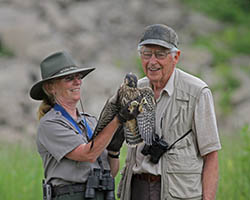
These National Park Service workers are helping a falcon learn to fly.
Biology, geology, or environmental science would all be possible majors to lead you to a career with the National Park Service.
I would suggest considering what types of jobs would most interest you there. You can find a list of jobs on their website(link is external). Based on that information, you can figure out whether your science degree should be in biology or another field.
I want to be a wildlife biologist. How long should I stay in school?
A Bachelor's degree is usually a minimum requirement to qualify for jobs as a wildlife biologist. Usually this requires at least 4 years of college after high school. To work in wildlife biology with greater independence (have more say in what you do or study) and to make more money, a Master's degree may be helpful. This usually takes an additional 2 or 3 years of study after a Bachelor's degree.
Beyond that, if you wish to teach or research at a university, you may need to earn a Doctor of Philosophy (PhD). Both Master's and PhD graduates can also work for the government or wildlife-related organizations. Make sure to check out the Beyond the University and Returning to University pages to understand whether or not a graduate degree will be helpful for your goals.
Is there anything you don't like about being a biologist?
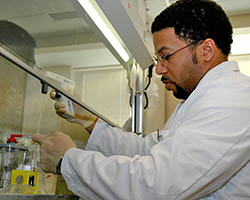
Redoing an experiment can be frustrating, but sometimes it is necessary. Image by the National Cancer Institute.
Just like any job, there are things someone might view as good or bad about being a biologist. I'm a research biologist, earning my PhD. For me, it can be frustrating when an experiment doesn't work, no matter how much time and effort I've devoted to it. But, this is simply a part of science.
When this happens, while it may be a bit upsetting, I still learn a lot about what I might be doing wrong and that helps me figure out my methods or even my question in more detail.
Didn't find the question or answer you were looking for? Check out the rest of the What's a Biologist story or feel free to send us a question. Want to explore what research is going on at Arizona State University? Visit the School of Life Sciences website to learn more.
Images via Wikimedia Commons.
View Citation
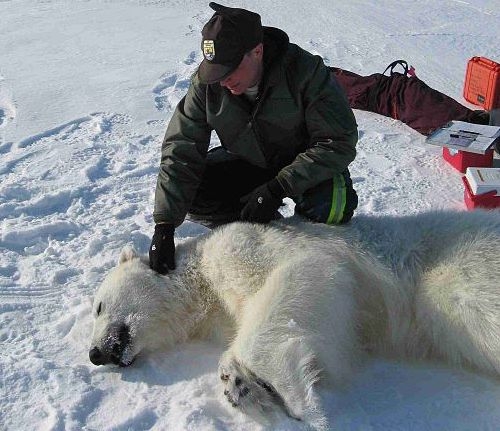
There are many parts of a biologist's job that you may wonder about. Here, a biologist is working with a polar bear.
Be Part of
Ask A Biologist
By volunteering, or simply sending us feedback on the site. Scientists, teachers, writers, illustrators, and translators are all important to the program. If you are interested in helping with the website we have a Volunteers page to get the process started.
Discover exciting careers in science and beyond by exploring fun virtual Worktours(link is external) of real companies.







